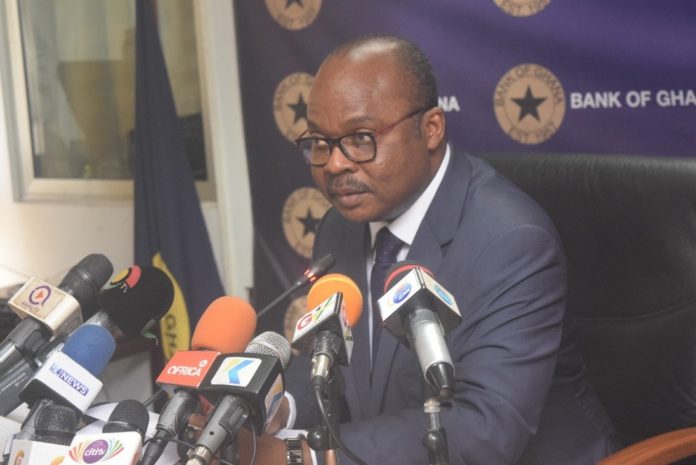Dr. Ernest Addison, BoG Governor
At the end of last week, The Bank of Ghana, in a surprise move, announced the revocation of the licenses of 192 insolvent microfinance and microcredit companies, which however were still operating, albeit under arduous conditions.
The central bank has also revoked the licenses of another 155 insolvent microfinance companies that had already ceased operations.
This brings the total number of MFIs liquidated to 347, and leaves just 137 of the erstwhile 484 licensed MFIs with authority to continue as licensed financial intermediaries.
BoG explained that its actions were taken pursuant to section 123 (1) of the Banks and Specialized Deposit-Taking Institutions Act, 2016 (Act 930).
This legislations requires the Central Bank to revoke the license of a bank or Specialised Deposit-taking Institution (SDI) where the Bank of Ghana determines that the institution is insolvent or is likely to become insolvent within the next 60 days.
Consequently, the Bank of Ghana has appointed Eric Nipah of Price WaterHouse Coopers as Receiver for the specified institutions in line with section 123 (2) of Act 930.
“By the revocation of these licenses, the Bank of Ghana seeks to protect the stability of the financial system and to protect affected depositors,” the central bank explained.
Much of the MFI industry has been deep in trouble for the past few years, due to a combination of poor corporate governance and risk management practices, and outright financial malfeasance by owners and managements, including diversion of deposits into other, unviable businesses and outright embezzlement. Some MFIs became insolvent simply because their cost of funds was to high to remain viable. Their having offered unsustainably high deposit rates to customers. Logistical shortcomings on behalf of their regulator, the BoG, with regards to its ability to conduct offsite reviews and nationwide onsite examinations enabled their problems to fester and intensify. Efforts by the BoG to get MFI owners to recapitalize proved largely fruitless. By the time the deadline for MFIs to recapitalize to a minimum of GHc2 million expired last year, barely a third had met the requirement.
The BoG’s license revocation announcement added that in order to salvage depositors’ funds, government has made funds available to enable the Receiver to pay depositors after their claims are validated.
Indeed, a week ago BoG Governor Dr Ernest Addison had revealed that government has put nearly GHc1 billion aside in an escrow account for this purpose. The refund of deposits will follow on refunds made to depositors of the defunct DKM last year. DKM failed spectacularly in early 2016, at which time it was one of the largest MFIs in the country.
While validated deposits will be refunded, other creditors will only retrieve their monies if the receiver is able to recover sufficient value from the remaining assets of the affected MFIs.
The BoG now hopes that voluntary mergers and acquisitions in the MFI industry will create fewer, but financially, stronger institutions in the sector. Business analysts and commentators however fret that the meltdown in the numbers of licensed MFIs will greatly reduce their market penetration, especially in the rural hinterlands. BoG officials retort that since most of the liquidated MFIs were either already non-operational or on the brink of self-inflicted collapse, they had already ceased to be effective financial intermediaries long before the central bank’s latest regulatory clamp-down.
Furthermore, the central bank has with effect from Friday May 31, 2019, revoked the licenses of 29 insolvent but still operational microcredit companies and another 10 which had already ceased operations for reason of insolvency, making 39 in all from this genre.
The Bank of Ghana has notified the Registrar of Companies at the Registrar General’s Department of the revocation of these licenses and has requested that the Registrar commence winding-up proceedings against these companies. However, since they were not licensed to accept deposits from the public, their liquidation will be a fairly straight forward process.
A total of 70 microcredit companies were licensed by the Bank of Ghana from 2011 until the end of 2015 under Act 774, to provide microloans.
Severe undercapitalization, poor lending and risk management practices, and poor corporate governance practices were among many other reasons accounting for the poor performance and eventual collapse of the 39 failed institutions whose licenses have been revoked.
Following the revocation of the licenses of these institutions, a total number of 31 microcredit companies will continue to operate.


